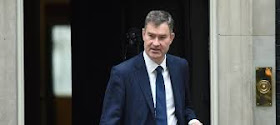They’re shocked. Appalled. Flabbergasted.
It seems that before voting to block a hard Brexit, the cross-party group of MPs opposing no-deal – the people I like to think of as the resistance – spoke to EU officials to check whether a request for a further delay would be granted if Britain requested one. The Brexiters are horrified. David Jones, a Tory MP, and one of BoJo’s accomplices – apologies, supporters – said that this:
... confirms the level of EU interference in our internal affairs and makes the need for Brexit all the more pressing.
I changed the word ‘accomplices’ back there because I’ve been warned about the importance of words. But more of that later.
It’s interesting that British MPs approaching EU officials amounts to unwarranted interference by the EU in our internal affairs. Does that mean that when Boris chatted to Trump at the Biarritz G7 meeting, that was similar interference by the US? Is it now a political sin to talk to our foreign partners before deciding how we should approach our partnership with them? Or is it simply that David Jones wants us only to consult and be guided by Boris?
Meanwhile, the bill to force BoJo to ask for a Brexit delay is due to receive royal assent on Monday. All eyes are on what Boris does next. Will he refuse to send the bill for assent? Will he refuse to abide by it when it becomes law? Is someone who suspended Parliament because he couldn’t get his way prepared to respect the law?
That we have to ask the question at all shows just how far we have sunk in this febrile coup atmosphere in which we live.
 |
| Tom Watson. So annoying that his political antennae are better than his leader’s |
Watson, deputy leader of the Labour Party, should it seems now get in line and stop acting against the will of his leader, Jeremy Corbyn. Whose will, according to Corbynists like Serwotka, should be religiously followed in all circumstances. Just like Boris feels all Conservatives should jump to his every whim.
Tom Watson is annoying to people like Serwotka because he has political instincts. Right at the start of the coup, Corbyn rushed off to Glasgow to do some election campaigning. Business as usual, for him. Tom Watson, on the other hand, got stuck in with the resistance, working immediately with the ‘Stop the Coup’ campaign in London. Corbyn only woke up to the importance of what was happening at the end of the week, when he also belatedly joined the movement.
No wonder Serwotka wants Watson silenced. Who’d want a deputy leader who so eloquently demonstrates how far off the pace his leader is? Especially when he shows it in practice and not just words.
Which takes me back to the subject of words.
I’ve had complaints about my use of the word ‘coup’. What Boris has done, my critics claim, is not a coup. It’s true that if a coup means tanks on the streets, military occupation of the TV stations and political opponents arrested, then it wasn’t a coup.
But there are far more insidious ways of seizing power illegitimately. What Boris did was even legal, as several judges have confirmed, but that only makes it more difficult to obstruct his power grab. The only defence we have in Britain to abusive executive power is Parliamentary oversight, an annoyance to would-be autocrats anywhere, so Boris decided to do away with it.
He would have established a precedent, and precedent is everything in a system governed by an unwritten constitution. It would have allowed the executive illicitly to take whatever power it wished, if it couldn’t bend Parliament to its will.
That is a coup.
It has to be resisted, as any coup should be resisted. Parliament deserves congratulations, and thanks, for having so resisted BoJo, so far with success.
While we’re on the subject of words, let’s look at this one too: conservative.
Generally, it means someone who wants to conserve things. In particular, that would include our conventions and political processes. It’s clear that BoJo has no intention of doing so. That makes him a radical, seeking to change Britain radically, though from the right rather than the left. A radical, not a conservative, with a small c, even though he leads the Conservative Party, with a capital C.
 |
| David Gauke Expelled for opposing his leader’s attack on democratic values |
That’s the party of Nigel Farage. BoJo’s behaviour is turning him, in Gauke’s words, into “Farage-lite”.
Powerful words. As words can be when you deploy them to maximise their impact. Gauke did it, and I apologise to no one for attempting to do the same.
No comments:
Post a Comment